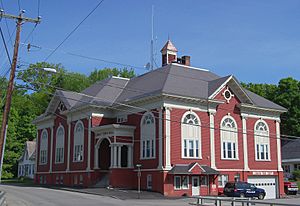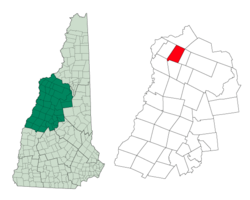Lisbon, New Hampshire facts for kids
Quick facts for kids
Lisbon, New Hampshire
|
||
|---|---|---|
|
Town
|
||

Lisbon Town Hall
|
||
|
||

Location in Grafton County, New Hampshire
|
||
| Country | United States | |
| State | New Hampshire | |
| County | Grafton | |
| Incorporated | 1763 | |
| Villages | Lisbon Barrett Savageville |
|
| Area | ||
| • Total | 26.7 sq mi (69.1 km2) | |
| • Land | 26.3 sq mi (68.0 km2) | |
| • Water | 0.4 sq mi (1.1 km2) 1.60% | |
| Elevation | 587 ft (179 m) | |
| Population
(2020)
|
||
| • Total | 1,621 | |
| • Density | 62/sq mi (23.9/km2) | |
| Time zone | UTC-5 (Eastern) | |
| • Summer (DST) | UTC-4 (Eastern) | |
| ZIP code |
03585
|
|
| Area code(s) | 603 | |
| FIPS code | 33-42020 | |
| GNIS feature ID | 0873647 | |
Lisbon is a charming town in Grafton County, New Hampshire, United States. It's located in the beautiful state of New Hampshire. In 2020, about 1,621 people lived there. Lisbon is famous for its annual lilac festival, which takes place on Memorial Day weekend.
The main part of town, called the Lisbon census-designated place (CDP), is home to 965 people. This area is found along U.S. Route 302 and the Ammonoosuc River. It's in the southwestern corner of the town.
Contents
Town History and Early Days
Lisbon has a long and interesting history. It was first given its official status in 1763. This was done by a colonial Governor named Benning Wentworth. Back then, it was called "Concord."
In 1764, the town's name changed to "Chiswick." This new name honored the Duke of Devonshire's castle. Later, in 1768, it changed again to "Gunthwaite." This name was for a relative of another colonial Governor, John Wentworth.
Finally, in 1824, the town was named "Lisbon." Governor Levi Woodbury chose this name. He picked it because his friend, Colonel William Jarvis, had been a consul (a government official) in Lisbon, Portugal. At one time, parts of what are now Littleton and Sugar Hill were part of Lisbon.
Early Industries and Inventions
In its early days, Lisbon was known for making charcoal. People also mined for iron, gold, and other minerals here. The Ammonoosuc River has narrow, steep falls. These falls provided water power for many watermills and factories.
The Parker Young Company was a very important business in Lisbon. It was once the biggest maker of piano sounding boards in the world! Lisbon also holds a special place in New Hampshire's history. It was the site of the state's first rope ski tow.
The Lisbon Area Historical Society helps people learn about the history of Lisbon and nearby towns like Landaff and Lyman. They collect and save old items and stories. This helps everyone appreciate the area's past and heritage.
Geography and Nature
Lisbon covers a total area of about 69.1 square kilometers (26.7 square miles). Most of this area, about 68.0 square kilometers (26.3 square miles), is land. The rest, about 1.1 square kilometers (0.4 square miles), is water. Water makes up about 1.60% of the town's total area.
The town gets its water from the Ammonoosuc River. The Gale River is also a tributary (a smaller river that flows into a larger one) of the Ammonoosuc.
The highest point in Lisbon is a hill located east of Pearl Lake. This hill reaches about 587 meters (1,920 feet) above sea level.
Town Population
The population of Lisbon has changed over the years. In 1830, there were 1,485 people living here. By 1900, the population had grown to 2,221. In 2020, the town's population was 1,621 people.
According to the 2010 census, there were 1,595 people living in Lisbon. There were 659 households (groups of people living together) and 439 families. The town had 809 housing units. Most people living in Lisbon were white.
The average household size was about 2.42 people. The average family size was 2.87 people. In 2010, about 22.9% of the population was under 18 years old. About 14.3% of the population was 65 years or older. The median age in town was 42.8 years.
Notable People from Lisbon
Many interesting people have connections to Lisbon. Here are a few:
- Franklin Gilman (1825–1880): He was born in Lisbon and later became a Wisconsin State Assemblyman and farmer.
- Herbert Archer "H.A." Richardson (1852–1942): A California pioneer, he was known as a timber baron and shipping magnate.
- C. C. Young (1869–1947): He served as the governor of California.
Images for kids
See also
 In Spanish: Lisbon (Nuevo Hampshire) para niños
In Spanish: Lisbon (Nuevo Hampshire) para niños





